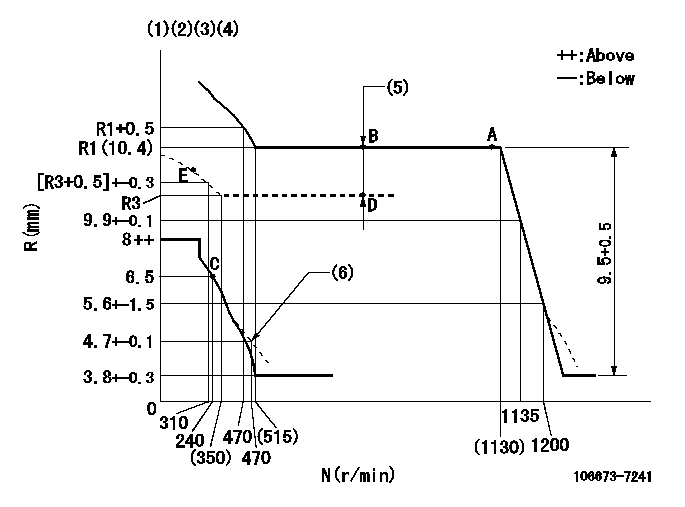Information injection-pump assembly
BOSCH
9 400 610 926
9400610926
ZEXEL
106673-7241
1066737241
MITSUBISHI
ME158106
me158106

Rating:
Service parts 106673-7241 INJECTION-PUMP ASSEMBLY:
1.
_
7.
COUPLING PLATE
8.
_
9.
_
11.
Nozzle and Holder
ME158153
12.
Open Pre:MPa(Kqf/cm2)
17.7{180}/21.6{220}
14.
NOZZLE
Include in #1:
106673-7241
as INJECTION-PUMP ASSEMBLY
Cross reference number
BOSCH
9 400 610 926
9400610926
ZEXEL
106673-7241
1066737241
MITSUBISHI
ME158106
me158106
Zexel num
Bosch num
Firm num
Name
Calibration Data:
Adjustment conditions
Test oil
1404 Test oil ISO4113 or {SAEJ967d}
1404 Test oil ISO4113 or {SAEJ967d}
Test oil temperature
degC
40
40
45
Nozzle and nozzle holder
105780-8140
Bosch type code
EF8511/9A
Nozzle
105780-0000
Bosch type code
DN12SD12T
Nozzle holder
105780-2080
Bosch type code
EF8511/9
Opening pressure
MPa
17.2
Opening pressure
kgf/cm2
175
Injection pipe
Outer diameter - inner diameter - length (mm) mm 8-3-600
Outer diameter - inner diameter - length (mm) mm 8-3-600
Overflow valve
131424-8020
Overflow valve opening pressure
kPa
255
221
289
Overflow valve opening pressure
kgf/cm2
2.6
2.25
2.95
Tester oil delivery pressure
kPa
157
157
157
Tester oil delivery pressure
kgf/cm2
1.6
1.6
1.6
Direction of rotation (viewed from drive side)
Right R
Right R
Injection timing adjustment
Direction of rotation (viewed from drive side)
Right R
Right R
Injection order
1-5-3-6-
2-4
Pre-stroke
mm
4.8
4.75
4.85
Beginning of injection position
Governor side NO.1
Governor side NO.1
Difference between angles 1
Cal 1-5 deg. 60 59.5 60.5
Cal 1-5 deg. 60 59.5 60.5
Difference between angles 2
Cal 1-3 deg. 120 119.5 120.5
Cal 1-3 deg. 120 119.5 120.5
Difference between angles 3
Cal 1-6 deg. 180 179.5 180.5
Cal 1-6 deg. 180 179.5 180.5
Difference between angles 4
Cyl.1-2 deg. 240 239.5 240.5
Cyl.1-2 deg. 240 239.5 240.5
Difference between angles 5
Cal 1-4 deg. 300 299.5 300.5
Cal 1-4 deg. 300 299.5 300.5
Injection quantity adjustment
Adjusting point
-
Rack position
10.4
Pump speed
r/min
1100
1100
1100
Each cylinder's injection qty
mm3/st.
133.5
129.5
137.5
Basic
*
Fixing the rack
*
Standard for adjustment of the maximum variation between cylinders
*
Injection quantity adjustment_02
Adjusting point
C
Rack position
6.5+-0.5
Pump speed
r/min
240
240
240
Each cylinder's injection qty
mm3/st.
14
11.9
16.1
Fixing the rack
*
Standard for adjustment of the maximum variation between cylinders
*
Injection quantity adjustment_03
Adjusting point
A
Rack position
R1(10.4)
Pump speed
r/min
1100
1100
1100
Average injection quantity
mm3/st.
133.5
131.5
135.5
Basic
*
Fixing the lever
*
Boost pressure
kPa
33.3
33.3
Boost pressure
mmHg
250
250
Injection quantity adjustment_04
Adjusting point
B
Rack position
R2(10.4)
Pump speed
r/min
700
700
700
Average injection quantity
mm3/st.
130
124
136
Fixing the lever
*
Boost pressure
kPa
33.3
33.3
Boost pressure
mmHg
250
250
Injection quantity adjustment_05
Adjusting point
D
Rack position
R3(R2-0.
8)
Pump speed
r/min
700
700
700
Average injection quantity
mm3/st.
113.5
109.7
117.3
Fixing the lever
*
Boost pressure
kPa
0
0
0
Boost pressure
mmHg
0
0
0
Injection quantity adjustment_06
Adjusting point
E
Rack position
-
Pump speed
r/min
100
100
100
Average injection quantity
mm3/st.
90
70
110
Fixing the lever
*
Boost pressure
kPa
0
0
0
Boost pressure
mmHg
0
0
0
Boost compensator adjustment
Pump speed
r/min
700
700
700
Rack position
R2-0.8
Boost pressure
kPa
6.7
4
9.4
Boost pressure
mmHg
50
30
70
Boost compensator adjustment_02
Pump speed
r/min
700
700
700
Rack position
R2(10.4)
Boost pressure
kPa
20
13.3
26.7
Boost pressure
mmHg
150
100
200
Timer adjustment
Pump speed
r/min
0
Advance angle
deg.
2.5
2
3
Timer adjustment_02
Pump speed
r/min
300
Advance angle
deg.
2.5
2
3
Remarks
Start
Start
Timer adjustment_03
Pump speed
r/min
-
Advance angle
deg.
0
0
0
Remarks
Measure the actual speed, stop
Measure the actual speed, stop
Test data Ex:
Governor adjustment

N:Pump speed
R:Rack position (mm)
(1)Lever ratio: RT
(2)Target shim dimension: TH
(3)Tolerance for racks not indicated: +-0.05mm.
(4)Boost compensator cancel stroke: BSL
(5)Boost compensator stroke: BCL
(6)Damper spring setting
----------
RT=1 TH=2.5mm BSL=2mm BCL=0.8+-0.1mm
----------
----------
RT=1 TH=2.5mm BSL=2mm BCL=0.8+-0.1mm
----------
Speed control lever angle

F:Full speed
----------
----------
a=16.5deg+-5deg
----------
----------
a=16.5deg+-5deg
0000000901

F:Full load
I:Idle
(1)Stopper bolt setting
----------
----------
a=25deg+-3deg b=28deg+-5deg
----------
----------
a=25deg+-3deg b=28deg+-5deg
Stop lever angle

N:Pump normal
S:Stop the pump.
(1)Use the hole at R = aa
(2)Rack position bb
(3)Stopper bolt setting
----------
aa=19mm bb=4-0.5mm
----------
a=37deg+7deg-5deg b=21.5deg+-5deg
----------
aa=19mm bb=4-0.5mm
----------
a=37deg+7deg-5deg b=21.5deg+-5deg
0000001501 RACK SENSOR

V1:Supply voltage
V2f:Full side output voltage
V2i:Idle side output voltage
(A) Black
(B) Yellow
(C) Red
(D) Trimmer
(E): Shaft
(F) Nut
(G) Load lever
1. Load sensor adjustment
(1)Connect as shown in the above diagram and apply supply voltage V1.
(2)Hold the load lever (G) against the full side.
(3)Turn the shaft so that the voltage between (A) and (B) is V2.
(4)Hold the load lever (G) against the idle side.
(5)Adjust (D) so that the voltage between (A) and (B) is V2i.
(6)Repeat the above adjustments.
(7)Tighten the nut (F) at the point satisfying the standards.
(8)Hold the load lever against the full side stopper and the idle side stopper.
(9)At this time, confirm that the full side output voltage is V2f and the idle side output voltage is V2i.
----------
V1=5+-0.02V V2f=0.15+-0.03V V2i=2.35-0.03V
----------
----------
V1=5+-0.02V V2f=0.15+-0.03V V2i=2.35-0.03V
----------
0000001601 MICRO SWITCH
Adjustment of the micro-switch
Adjust the bolt to obtain the following lever position when the micro-switch is ON.
(1)Speed N1
(2)Rack position Ra
----------
N1=325r/min Ra=6.5+-0.1mm
----------
----------
N1=325r/min Ra=6.5+-0.1mm
----------
Timing setting

(1)Pump vertical direction
(2)Coupling's key groove position at No 1 cylinder's beginning of injection
(3)B.T.D.C.: aa
(4)-
----------
aa=12deg
----------
a=(6deg)
----------
aa=12deg
----------
a=(6deg)
Information:
Start By:a. remove oil pump 1. Check each main bearing cap (2) for its location on the engine. Each cap has an arrow (1) which shows the direction of the front of the block and a number (3) which gives the location of that cap.2. Remove No. 2 through No. 6 main bearing caps from the engine. Remove the lower bearings from the caps.3. Remove the thrust plate from each side of the No. 4 upper main bearing. 4. Turn the crankshaft until Tool (A) can be installed in oil hole (4). Turn the crankshaft in the direction which will push the upper main bearing out, tab end first.
If the crankshaft is turned in the wrong direction, the tab of the bearing will be pushed between the crankshaft and the cylinder block. This will cause damage to the crankshaft and block.
Install the main bearings dry when clearance checks are made. Put clean engine oil on the main bearings for final assembly. 5. Install lower bearings in the bearing caps.6. Install upper bearings in the cylinder block with Tool (A). Be sure tab (5) on the back of the bearings fits in the groove of the caps and cylinder block. When the bearing clearance is checked and the engine is in a vertical position such as in the vehicle, the crankshaft will have to be lifted up and held against the upper halves of the main bearings to get a correct measurement with plastigage (B). The Plastigage will not hold the weight of the crankshaft and give a correct indication. If the engine is in a horizontal position, such as on an engine stand, it is not necessary to hold the crankshaft up. Do not turn crankshaft when the Plastigage is in position to check clearance.
Do not use an impact wrench to tighten the bolts the additional 120 degrees.
7. Check the bearing clearance with Plastigage (B) as follows:a. Put clean oil on the threads of the cap bolts. Install the caps and cap bolts, finger tight.b. Tighten the bolts on the tab end of the caps first to a torque of 260 14 N m (190 10 lb ft)c. Tighten the bolts on the other end of the caps to a torque of 260 14 N m (190 10 lb ft).d. Put a mark across the bolt head and cap. Tighten the bolts opposite the tab end 120 degrees more. Tighten the bolts on the tab end of the cap 120 degrees more. Make sure the main bearing caps are installed with their identification number (7) in alignment with the identification number on the left side of the cylinder block and arrow (6) toward the front of the block.8. Remove the main bearing caps and Tool (B).9. Measure the thickness of the Plastigage to find the bearing clearance. The clearance for new bearings must be 0.091 to 0.186 mm (.0036 to .0073 in). The maximum clearance for used bearings is 0.025 mm (0.010 in).10.
If the crankshaft is turned in the wrong direction, the tab of the bearing will be pushed between the crankshaft and the cylinder block. This will cause damage to the crankshaft and block.
Install the main bearings dry when clearance checks are made. Put clean engine oil on the main bearings for final assembly. 5. Install lower bearings in the bearing caps.6. Install upper bearings in the cylinder block with Tool (A). Be sure tab (5) on the back of the bearings fits in the groove of the caps and cylinder block. When the bearing clearance is checked and the engine is in a vertical position such as in the vehicle, the crankshaft will have to be lifted up and held against the upper halves of the main bearings to get a correct measurement with plastigage (B). The Plastigage will not hold the weight of the crankshaft and give a correct indication. If the engine is in a horizontal position, such as on an engine stand, it is not necessary to hold the crankshaft up. Do not turn crankshaft when the Plastigage is in position to check clearance.
Do not use an impact wrench to tighten the bolts the additional 120 degrees.
7. Check the bearing clearance with Plastigage (B) as follows:a. Put clean oil on the threads of the cap bolts. Install the caps and cap bolts, finger tight.b. Tighten the bolts on the tab end of the caps first to a torque of 260 14 N m (190 10 lb ft)c. Tighten the bolts on the other end of the caps to a torque of 260 14 N m (190 10 lb ft).d. Put a mark across the bolt head and cap. Tighten the bolts opposite the tab end 120 degrees more. Tighten the bolts on the tab end of the cap 120 degrees more. Make sure the main bearing caps are installed with their identification number (7) in alignment with the identification number on the left side of the cylinder block and arrow (6) toward the front of the block.8. Remove the main bearing caps and Tool (B).9. Measure the thickness of the Plastigage to find the bearing clearance. The clearance for new bearings must be 0.091 to 0.186 mm (.0036 to .0073 in). The maximum clearance for used bearings is 0.025 mm (0.010 in).10.